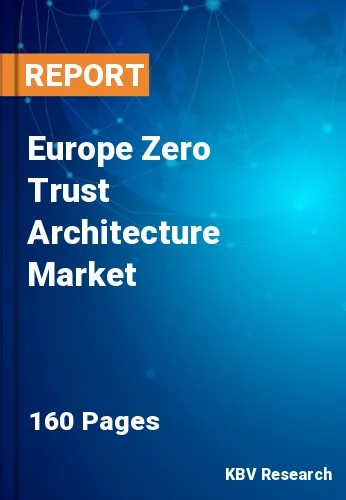The Europe Zero Trust Architecture Market would witness market growth of 15.6% CAGR during the forecast period (2023-2030).
The zero trust architecture market prospects appear promising as organizations across industries recognize the imperative of adopting a more robust and adaptive security posture. Organizations are compelled to reassess their security strategies due to the escalating intricacy of IT environments and the heightened frequency and severity of cyberattacks. Zero trust architecture, emphasizing continuous verification and least privilege access, aligns with the evolving nature of cyber threats and provides a proactive defense mechanism.
One of the key drivers for the future growth of the market is the widespread adoption of remote work. The traditional perimeter-based security model is ill-suited for securing remote workers who access corporate resources from various locations and devices. ZTA, by design, is well-suited to address the challenges posed by the remote work paradigm, ensuring that access is granted based on verified identity and contextual factors, irrespective of the user's location.
Europe's enterprises are undergoing significant digital transformation, with widespread adoption of cloud services, IoT (Internet of Things), and remote work setups. Among EU Member States, Czechia recorded the highest share of enterprises (44%; see footnote) that used internet-connected devices or systems with remote monitoring or control via the Internet in 2020. Czechia was followed by Finland (40%), Austria (32%), Belgium (27%), and Malta (26%). Therefore, these factors collectively contribute to the growing adoption of zero-trust architecture in Europe, positioning it as a pivotal framework for addressing evolving cybersecurity challenges while meeting regulatory requirements and aligning with the region's technological landscape.
The Germany market dominated the Europe Zero Trust Architecture Market, By Country in 2022, and would continue to be a dominant market till 2030; thereby, achieving a market value of $3.2 billion by 2030. The UK market is exhibiting a CAGR of 14.5% during (2023 - 2030). Additionally, The France market would experience a CAGR of 16.4% during (2023 - 2030).
Based on Component, the market is segmented into Solution, and Services. Based on Organization Size, the market is segmented into Large Enterprises, and Small & Medium Enterprises. Based on Deployment Type, the market is segmented into On-premise, and Cloud. Based on Vertical, the market is segmented into IT & ITeS, Energy & Utilities, Healthcare, Government & Defense, Retail & Ecommerce, BFSI, and Others. Based on countries, the market is segmented into Germany, UK, France, Russia, Spain, Italy, and Rest of Europe.
Free Valuable Insights: The Global Zero Trust Architecture Market will Hit $49.6 Billion by 2030, at a CAGR of 15.8%
The market research report covers the analysis of key stake holders of the market. Key companies profiled in the report include Palo Alto Networks, Inc., VMware, Inc., Zscaler, Inc., Akamai Technologies, Inc., Microsoft Corporation, Cisco Systems, Inc., IBM Corporation, Citrix Systems, Inc. (Cloud Software Group, Inc.), Check Point Software Technologies Ltd. and Forcepoint LLC (Francisco Partners).
By Component
By Organization Size
By Deployment Type
By Vertical
By Country
Our team of dedicated experts can provide you with attractive expansion opportunities for your business.

